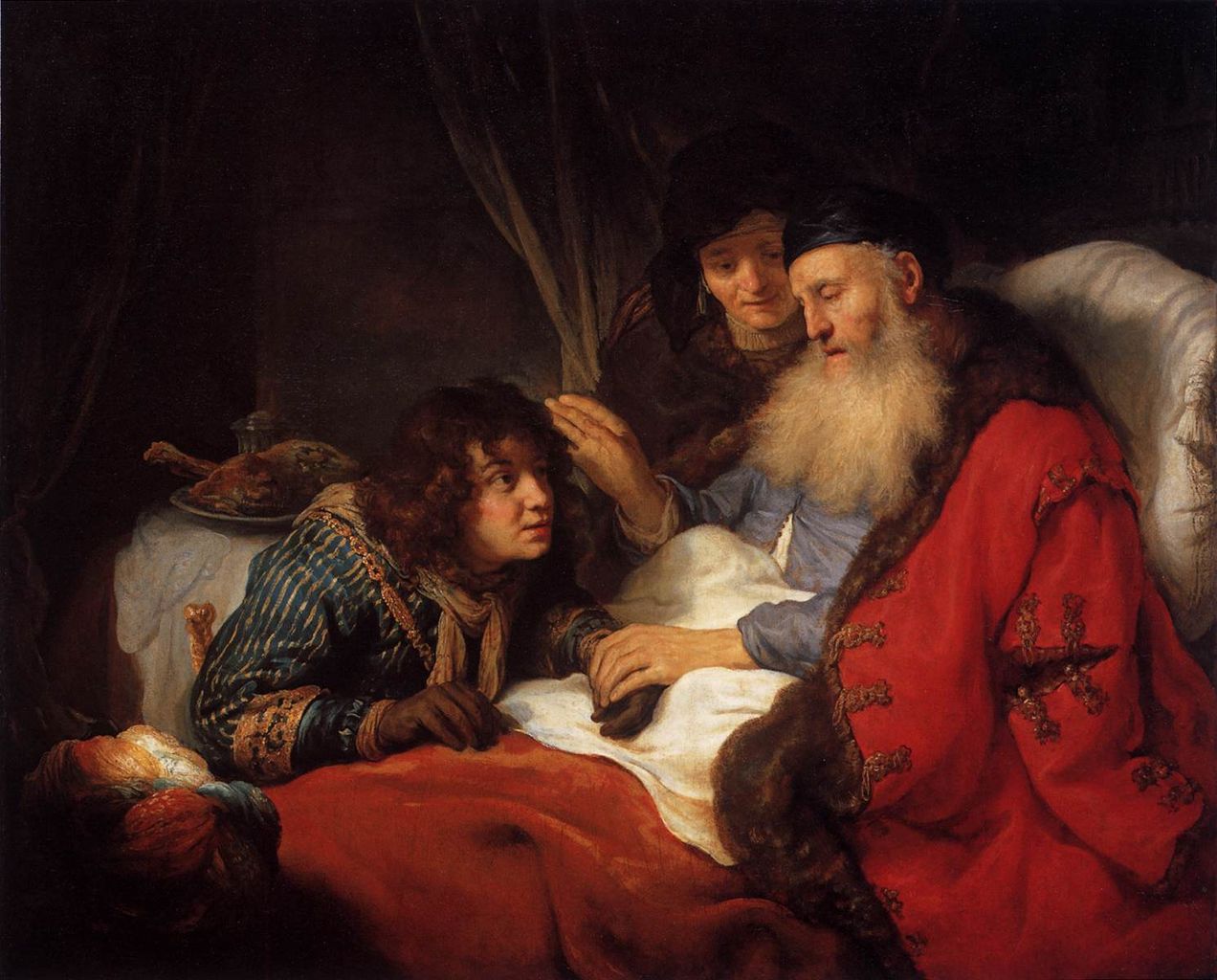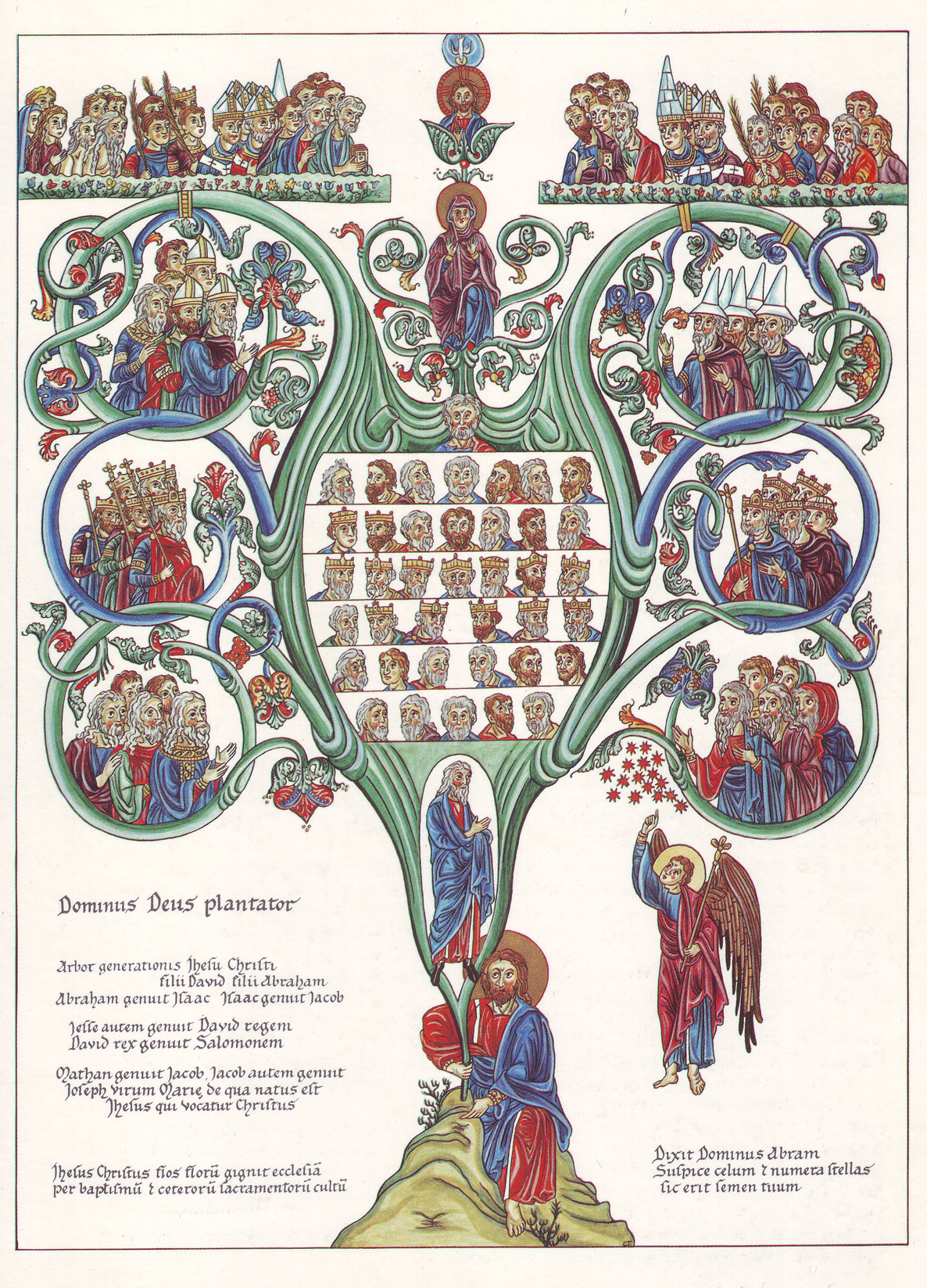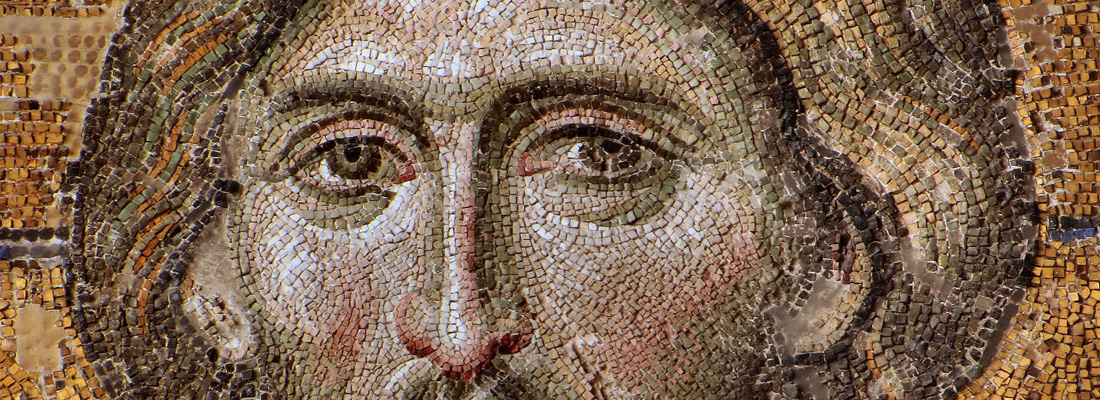Thursday in the 3rd Week of Advent: Genesis 49:2, 8-10, Matthew 1:1-17
Today’s readings are bursting with royal significance; pregnant, as it were, with the promise of triumph. It’s no wonder that expectations for the Messiah were so high by the time Jesus was born. God’s promise to His People is so great. Unimaginably great, and given their geopolitical crush of occupying powers, they could not help but try to materialize this promise in earthly kingdom-making. But this was never God’s plan. He offers lasting peace, but a peace of the soul that is much deeper and more significant than the temporal peace found in human boundary-drawing. This misunderstanding and lack of preparedness in the hearts of the Jewish nation would mean a horrible crucifixion of God Himself, but this proves to be the very action by which God ushers His peace into the world.
The first reading from Genesis presents Jacob (given the name Israel by God) on his deathbed, calling his sons around him and prognosticating their futures. These men, his sons, are the heads of the twelve tribes of Israel. We might remember that Jacob is a bit of a beloved scoundrel — he swipes his older brother Esau’s birthright impersonating him to their blind, old father Isaac on his deathbed (albeit, according to his mother Rebecca’s plot). Jacob also had children via four women (two wives and two handmaids to the wives) and famously showed favor to the second wife, Rachel, and her sons, Joseph and Benjamin. So, while Jacob (Israel) is the very foundation of the Jewish nation, we must recognize that he is very far from perfect and yet blessed and loved by God nonetheless. Two lessons here: the Chosen People have a lot of growing to do in forming themselves to God’s image, and God will continue to mysteriously love us and bless us even in our sins and stupidity.

Today’s reading gives us Jacob’s words about his son Judah, who is not really his favorite, a middle son to his first wife Leah. But Judah receives the second-best treatment in the book of Genesis, advocating for selling Joseph to the caravan rather than killing him, interceding on Benjamin’s behalf, and showing strong leadership among his brothers. Judah seems blessed by God. And Jacob acknowledges this: “You, Judah, shall your brothers praise … Judah, like a lion’s whelp, you have grown up on prey, my son. He crouches like a lion recumbent, the king of beasts–who would dare rouse him?” In some ways, this is a curious statement because other sons have shown much more violence than Judah. Simeon and Levi, in particular, slaughter all the men in the city for the rape of their sister Dinah. So, how has he “grown up on prey” other than having to live in the wake of his father (the lion) and his dealings? It also seems a bit like a backhanded compliment offered to someone you secretly fear: a crouching lion, who would dare rouse him? I think Jacob sees the greatness in him and his line, but does not quite know what to make of it. This is appropriate, since the Messiah will come from his line and the people will not know what to make of Him, either.
I do like this image, though: a lion recumbent. We’ll return to this in reference to Christ.
Jacob foresees another thing in Judah: “The scepter shall never depart from Judah.” This and the accompanying lines about the mace and tribute brought to him speak to a lasting reign, a lasting peace, that comes through Judah.

Today’s responsorial psalm spikes the readings with significance. We sing: “Justice shall flourish in his time, and fullness of peace for ever.” This links overtly to the last words we hear from Jacob about his son Judah. But we know that the psalmist speaks inside and outside his own time here, not necessarily about Judah or even King David, but of the ultimate destiny of the nation, God’s plan for his people. Thus, we read many figures in the following lines: “O God, with your judgment endow the king, and with your justice, the king’s son; He shall govern your people with justice and your afflicted ones with judgment.” In light of the first reading, the “king” is Israel and the “king’s son” is Judah. Closer to the historical time of the psalmist, the “king” could be King David and the “king’s son” Solomon, the wisest of all men, blessed by God. In both cases, we see the extension of a familial reign, where a father and son extend a reign of justice and righteous judgment. As Christians, we see the deeper theological meaning of God the Father and Jesus Christ, His Son establishing a heavenly kingdom. Christ is also in the line of both Judah and David, as we shall read in the gospel. He unites the earthly and heavenly, the human and the divine. Today, we are urged to consider how Jesus Christ ushers in “fullness of peace for ever.” What could this mean after two millennia of wars, death and strife? Most unbelievers would be happy to point this out as a refutation of our “wishful thinking.”
Let’s consider this in light of the gospel reading, the opening to St. Matthew’s gospel. Lectors everywhere cringe with dread over having to pronounce this seemingly endless string of biblical names. Kids shift on their feet, dads space out with glazed looks, even a pious mom or two wonders if we have to hear the whole list. Well, take heart because Matthew didn’t stuff his gospel with filler. His Jewish listeners would quickly be steeped in the history of their nation, great figures and the stories surrounding them would immerse them in an illustrious familial history. Even today, we can recognize some seminal names: Isaac, Judah, Ruth, Jesse, David, Solomon. As the list builds and swells, we anticipate a culmination. We participate in an Advent expectation as we wait to see where this is heading. He ends it: “… Jacob the father of Joseph, the husband of Mary. Of her was born Jesus who is called the Christ.” Jesus who is called the Christ is the fulfillment of this heritage. With the weight of 2,500 years of Jewish prophecy, we realize that God’s plan is here laid out for us. And Matthew punctuates this larger plan by showing how 14 generations separate Abraham and David, David and the Babylonian Exile, and the Exile and Jesus Christ. There is a perfection in this, a plan. We mentioned earlier how Jacob’s (Israel’s) imperfections reveal how much growing the nation had to do in order to be ready to receive Christ. Well over a thousand years later, God determines that Mary embodies the readiness of the nation.

This gospel reading requires patience to read, patience to hear, and patience to contemplate its significance. How the Holy Spirit blessed the evangelist! Just hearing this gospel as it is written brings us closer to God in receptiveness and spirit. The psalms recall God’s perception of time: “For a thousand years in your sight are like yesterday when it is past, or like a watch in the night” (Ps 90:4). This doesn’t mean that God could care less about what happens in the span of those thousand years — quite the contrary, He constantly, tirelessly offers his grace and forgiveness to everyone at every second. It’s just that his love is so overwhelming and so much the fabric of Him that little setbacks (like a semi-scoundrel called Jacob or a spaced-out dad at Mass) are meaningless. We can often overlook flaws in a loved one. We realize that the little things don’t matter; in fact, little flaws can be endearing. Thus, love is the lens by which patience is a part of God’s character. Patience is a virtue (as my mom repeated endlessly to me) because it goes hand-in-glove with the love that God is. The gospel brings this patience to us experientially, and we begin to understand that 42 generations in a family is simply the time it takes for the Word of God to germinate.
Once we struggle through our antsiness, do our breathing or mindfulness training or meditation and finally achieve patience, we perhaps notice something else. True patience, the kind that is tethered to love, is nearly indistinguishable from a peaceful heart.
Think of it: we push aside the things that make us impatient, disquieting things, in order to achieve patience. We have to focus on something of a longer perspective, not the little things here and now that make us antsy to get something resolved. We adjust our bearings and this longer, broader field of vision gives us the ability to relax and be patient. What is that but a taste of peacefulness?
This gospel reading provides that long view to start to grasp a bit of God’s plan. If we’re fidgeting or spacing out, it’s likely because we’re thinking of something other than encountering Christ. If we yearn for God and His entrance to humanity, this gospel allows us to join in God’s patience over the generations.
And at the end of the genealogy lies our lion, recumbent in a manger.
I love the combination of the two readings today because it gives us this image: Christ, the king of the beasts, a lion, yet recumbent. There are so many ways this image resonates with me. King of the beasts, of course, meaning king of all creation; Christ is King of the Universe. “Who would dare rouse him?” takes on a solemnity as we consider the shepherds, angels, and the magi adoring the Christ child. But the idea of a recumbent lion is perhaps the most evocative. The dangerousness and ferocity of the lion is well-known and feared — we might consider the fears of Israel’s neighbors in the Old Testament upon their entrance into the Levant, knowing that no army could stand in the way of God and His plan. Or we might consider that Christ will come again for the Final Judgment. But the lion is recumbent. The great question: Why?

God is the primary mover, there is no force that exerts against Him. Nothing would make Him be recumbent but His own will. Why does He choose to sit back and be peaceable, despite His awesome power? Perhaps this is the point in itself. As Christ teaches us, there is a power greater than what comes from kings and swords. This power arises from love — first for our Creator and then for our fellow human — and gives birth to charity, never violence. This is the promised “fullness of peace forever.” It comes not from an unbeatable army and impregnable national border (talking to you, U.S.A.), but from the fragile and mercurial hearts of humans, transformed and forged into something made stronger than armies by the grace of God. Christ gives us a Way to achieve peace in our hearts, which in truth is the only peace that matters because it is the achievement of the Kingdom. He is the way, He is the mystical bond between us and God and the gateway to the Kingdom. We will sing this at His coming in a week and a half with the angels: “Glory to God in the highest heaven, and on earth peace among those whom he favors!”
I want to thank Suzanne for sharing her thoughts this morning about today’s psalm and its relation to our reflection yesterday. She got me excited to write this reflection. Marriage is a blessing!